Unit-16篇章翻译(四)
- 格式:doc
- 大小:39.00 KB
- 文档页数:5
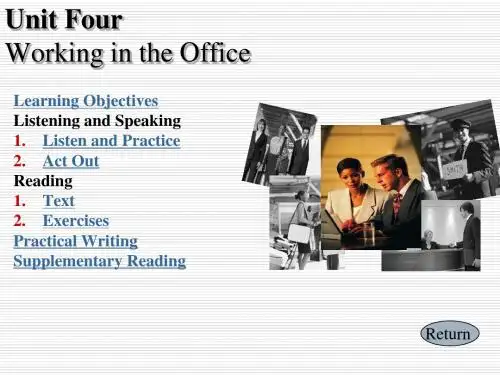
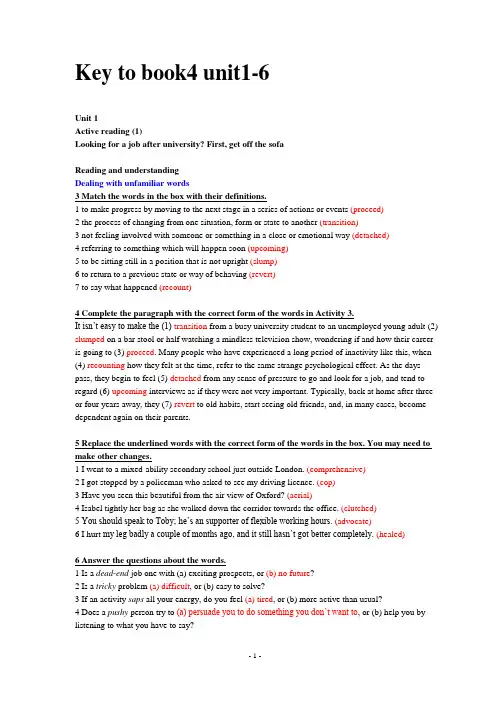
Key to book4 unit1-6Unit 1Active reading (1)Looking for a job after university? First, get off the sofaReading and understandingDealing with unfamiliar words3 Match the words in the box with their definitions.1 to make progress by moving to the next stage in a series of actions or events (proceed)2 the process of changing from one situation, form or state to another (transition)3 not feeling involved with someone or something in a close or emotional way (detached)4 referring to something which will happen soon (upcoming)5 to be sitting still in a position that is not upright (slump)6 to return to a previous state or way of behaving (revert)7 to say what happened (recount)4 Complete the paragraph with the correct form of the words in Activity 3.It isn’t easy to make the (1) transition from a busy university student to an unemployed young adult (2) slumped on a bar stool or half watching a mindless television show, wondering if and how their career is going to (3) proceed. Many people who have experienced a long period of inactivity like this, when (4) recounting how they felt at the time, refer to the same strange psychological effect. As the days pass, they begin to feel (5) detached from any sense of pressure to go and look for a job, and tend to regard (6) upcoming interviews as if they were not very important. Typically, back at home after three or four years away, they (7) revert to old habits, start seeing old friends, and, in many cases, become dependent again on their parents.5 Replace the underlined words with the correct form of the words in the box. You may need to make other changes.1 I went to a mixed-ability secondary school just outside London. (comprehensive)2 I got stopped by a policeman who asked to see my driving licence. (cop)3 Have you seen this beautiful from the air view of Oxford? (aerial)4 Isabel tightly her bag as she walked down the corridor towards the office. (clutched)5 You should speak to Toby; he’s an supporter of flexible working hours. (advocate)6 I hurt my leg badly a couple of months ago, and it still hasn’t got better completely. (healed)6 Answer the questions about the words.1 Is a dead-end job one with (a) exciting prospects, or (b) no future?2 Is a tricky problem (a) difficult, or (b) easy to solve?3 If an activity saps all your energy, do you feel (a) tired, or (b) more active than usual?4 Does a pushy person try to (a) persuade you to do something you don’t want to, or (b) help you by listening to what you have to say?5 If you feel apathy, do you want to (a) change the world, or (b) stay at home and do nothing?7 Answer the questions about the phrases.1 Is fork out (a) a formal, or (b) an informal way of saying to pay for something?2 If you are in the same boat as another person, are you (a) making the same journey together, or (b) in the same difficult or unpleasant situation?3 If you feel you have come full circle, do you (a) feel you are back where you started, or (b) feel a sense of satisfaction because you have completed something?4 If someone takes a soft line, do they deal with a person (a) in a kind and sympathetic way, or (b) in a lazy way without making a decision?5 If you strike the right note about something, are you expressing yourself (a) well, or (b) badly?6 If you do something by all means, do you (a) try your best to do it, or (b) not care about it?7 If you nudge someone back into the saddle, are you encouraging them to (a) take responsibility again, or (b) take it easy?8 If you talk through a problem with someone, do you (a) examine it carefully and sensitively, or (b) refer to it quickly and then change the subject?Active reading (2)If you ask meDealing with unfamiliar words4 Match the words in the box with their definitions.1 funny or entertaining (amusing)2 used for emphasizing that something good has happened, especially because of good luck (fortunately)3 an amount of money that a person, business or country borrows, usually from a bank (loan)4 to take an amount or number from a total (deduct)5 the most exciting, impressive, or interesting part of an event (highlight)6 to show that you understand someone’s problems (sympathize)7 needing a lot of time, ability, and energy (demanding)5 Complete the conversation with the correct form of the words in Activity 4.A After three years at university, I’m now quite heavily in debt.B I (1) sympathize with you, I know what it’s like to have financial problems. But (2) fortunately I didn’t need to take out a student (3) loan when I was at university, because I had a part-time job.A What did you do?B I worked in a restaurant at weekends.A That must have been very (4) demanding.B Yes, it was. I had to get the right balance between work and study. But the other people who worked there were good fun to be with, so it was quite (5) amusing too. The (6) highlight of the weekend was always Saturday night when we worked overtime.A But I don’t expect you made a lot of money?B No, there wasn’t much after they’d (7) deducted tax and pension contributions. But it was enough to keep me going.6 Replace the underlined words with the correct form of the words in the box. You may need to make other changes.1 When I was at college I kept all my personal things in an old cupboard.2 A lot of people who leave university before getting a degree end up in good jobs.3 I think she’ll get a good degree, but I wouldn’t risk my money on the exact result.4 The money I spent at college was more than what I earned in my part-time job.5 The chances of my being offered a job after that interview must be quite remote.6 Our business has done very well since we changed our advertising.7 I think telling the truth and not cheating is always the best policy.Key:(1) belongings (2) dropouts (3) gamble (4) exceeded (5) odds(6) has thrived (7) honesty7 Answer the questions about the words and expressions.1 If something is not all it’s cracked up to be, is it (a) valid and interesting, or (b) just a little bit disappointing?2 If someone keeps banging on about something, are you likely to be (a) interested in, or (b) bored by what they say?3 If there is a lot of hassle in your life, are you likely to feel (a) stressed, or (b) relaxed?4 If something happens out of the blue, is it (a) unexpected, or (b) part of your plan?5 If you say you ended up in a particular job, do you suggest that (a) you have fulfilled your ambition, or (b) it happened almost by chance?6 Are the regulars in a pub (a) the customers who come very often, or (b) the food the pub offers most often?7 If something is dead easy, is it (a) very easy, or (b) not easy at all?8 If you treat someone to something, do you (a) buy something nice for them, or (b) behave badly to them?9 If you cheer a place up, do you (a) make the place look brighter, or (b) make the people in the place happier?Reading and interpreting8 Look at the sentences from the passage and identify the style features.1 Twelve years at school and three years at university, teachers banging on about opportunities in the big wide world beyond our sheltered life as students, and what do I find?This shows the informality of an incomplete sentence in the first part, the use of an informal expression (banging on) and a rhetorical question to the reader (What do I find?)2 Try as I might to stay cheerful, all I ever get is hassle, sometimes with people (especially boys, god, when will they grow up?) …This has the use of an informal word (hassle), an informal exclamation (god) and a question to the reader (When will they grow up?)3 Actually, I had my eye on the course at the London School of Economics (LSE).Here there is a discourse marker typical of speech (Actually) and an informal phrase (had my eye on).4 I kind of understand it, and not just because my degree is in economics.Here “kind of” is a sort of discours e marker of informal speech (showing something is general, vague or not definite).5 I wanted something in finance and investments, because you know, maybe with a job like that, I could use my degree.This has a discourse marker of informal speech (you know).6 ... it’s true, he really did seem to have three hands.Again here is a discourse marker of informal speech (it’s true).7 I talked to him about ... well, about pretty well everything …This has another discourse marker of informal speech (well) and an informal phrase (pretty well). Language in useword formation: compound nouns1 Write the compound nouns which mean:1 a degree which is awarded a first class (a first-class degree)2 work in a hospital (hospital work)3 a ticket for a plane journey (a plane ticket)4 a discount for students (a student discount)5 a pass which allows you to travel on buses (a bus pass)6 a room where an interview is held (an interview room)7 a period spent in training (a training period)word formation: noun phrases2 Write the noun phrases which mean:1 a career which is rewarding from the financial point of view (a financially rewarding career)2 legislation which has been introduced recently (recently introduced legislation)3 instructions which are more complex than usual (unusually complex instructions)4 an institution which is orientated towards academic (academically orientated work)5 work which makes physical demands on you (physically demanding work)6 information which has the potential to be important (potentially important information)7 candidates who have been selected after a careful procedure (carefully selected candidates)8 a coursebook in which everything has been planned beautifully (a beautifully planned textbook)try as … might3 Rewrite the sen tences using try as … might .1 I’m trying to fill this last page, but I just can’t think of anything.Try as I might to fill this last page, I just can’t think of anything.2 I try to be friendly with Marta, but she doesn’t seem to respond.Try as I might to be friendly with Marta, she doesn’t seem to respond.3 I try hard to get to sleep, but I can’t help thinking about my family.Try as I might to get to sleep, I can’t help thinking about my family.4 He just doesn’t seem to get the promotion he deserves, even though he keeps trying.Try as he might, he just doesn’t seem to get the promotion he deserves. / Try as he might to get thepromotion he deserves, he just doesn’t seem to get it.5 I keep trying to remember her name, but my mind is a blank.Try as I might to remember her name, my mind is a blank.given that …4 Rewrite the sentences using given that …1 Since I know several languages, I thought I would look for work abroad.Given that I know several languages, I thought I would look for work abroad.2 Xiao Li has the best qualifications, so she should get the job.Given that Xiao Li has the best qualifications, she should get the job.3 Since we’re all here, I think it would be a good idea to get down to some work.Given that we’re all here, I think it would be a good idea to get down to some work.4 Since it’s rather late, I think we should leave this last task until tomorrow.Given that it’s rather late, I think we should leave this last task until tomorrow.clauses introduced by than5 Rewrite the sentences using clauses introduced by than .1 She’s experienced at giving advice. I’m more experienced.She’s less experienced at giving advice than I am. / I’m more experienced at giving advice than she is.2 You eat too much chocolate. It isn’t good f or you.You eat too much chocolate than is good for you.3 She worked very hard. Most part-timers don’t work so hard.She worked harder than most part-timers do.4 You have arrived late too many times. That isn’t acceptable.You have arrived late more times than is acceptable.5 I don’t think you should have given so much personal information. It isn’t wise.I think you have given more personal information than is wise.collocations6 Read the explanations of the words. Answer the questions.1 highlight A highlight is the most exciting, impressive, or interesting part of an event.(a) What would you like to be the highlight of your career?I would like the highlight of my student career to be to receive a national award for the best student research project.(b) How can you highlight an important sentence in a text?You can underline it in pencil or pen or you can use coloured pens or highlighters.(c) What are the edited highlights of a football match?The highlights are when someone scores a goal or prevents one from being scored.2 loan A loan is an amount of money someone borrows from someone else.(a) Have you ever taken out a loan?No, I haven’t. But my parents have taken out several loans to buy kitchen equipment.(b) What is the best way to pay off a loan?It is best to pay a loan off quickly, although you will still have to pay some interest.(c) If you have a library book on loan, what do you have to do with it?You have to return it before the date it is due, otherwise you may have to pay a fine.3 thrive To thrive means to be very successful, happy or healthy.(a) What sort of business thrives best in your part of the country?In my part of the country, light industries and electronics companies thrive.(b) Which sort of plants thrive in a hot climate?In a hot climate you can see tropical fruit and vegetables thrive and also tropical plants and trees. (c) Why do you think some couples thrive on conflict?It is difficult to understand why some couples thrive on conflict. Maybe each one wants to compete with the other or maybe they enjoy “kissing and making up” after the conflict.7 Translate the paragraphs into Chinese.If you ask me, real life is not all it’s cracked up to be. Twelve years at school and three years at university, teachers banging on about opportunities in the big wide world beyond our sheltered life as students, and what do I find?Try as I might to stay cheerful, all I ever get is hassle, sometimes with people (especially boys, god, when will they grow up?), but mostly with money. It’s just so expensive out here! Everyone wants a slice off you. The Inland Revenue wants to deduct income tax, the bank manager wants repayments on my student loan, the landlord wants the rent, gas, water, electricity and my mobile bills keep coming in, a nd all that’s before I’ve had anything to eat. And then some bright spark calls me out of the blue, asking if I’m interested in buying a pension. At this rate, I won’t even last till the end of the year, let alone till I’m 60.(☞翻译时可以根据上下文增译,即增加原文暗含了但没有直接表达出来的意思。
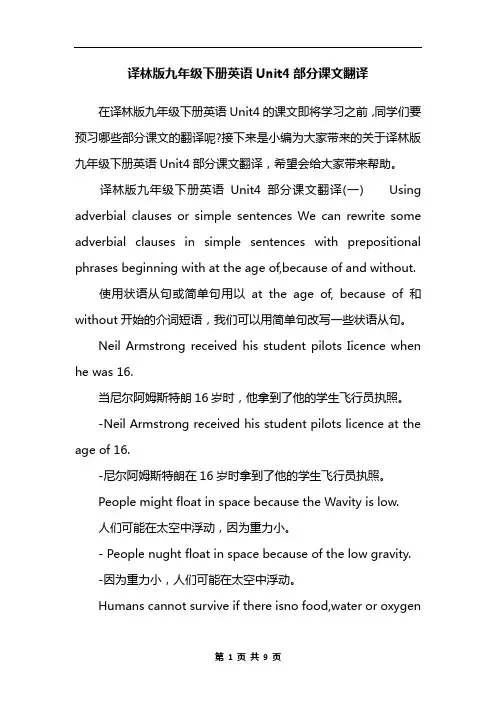
译林版九年级下册英语Unit4部分课文翻译在译林版九年级下册英语Unit4的课文即将学习之前,同学们要预习哪些部分课文的翻译呢?接下来是小编为大家带来的关于译林版九年级下册英语Unit4部分课文翻译,希望会给大家带来帮助。
译林版九年级下册英语Unit4部分课文翻译(一) Using adverbial clauses or simple sentences We can rewrite some adverbial clauses in simple sentences with prepositional phrases beginning with at the age of,because of and without.使用状语从句或简单句用以at the age of, because of和without开始的介词短语,我们可以用简单句改写一些状语从句。
Neil Armstrong received his student pilots Iicence when he was 16.当尼尔阿姆斯特朗16岁时,他拿到了他的学生飞行员执照。
-Neil Armstrong received his student pilots licence at the age of 16.-尼尔阿姆斯特朗在16岁时拿到了他的学生飞行员执照。
People might float in space because the Wavity is low.人们可能在太空中浮动,因为重力小。
- People nught float in space because of the low gravity.-因为重力小,人们可能在太空中浮动。
Humans cannot survive if there isno food,water or oxygen如果没有食物、水和氧气,人类不能生存。
- Humans cannot survive without food,water or oxygen- 没有食物、水和氧气,人类不能生存。

P44:罗杰:嗨,米歇尔。
你过得如何?米歇尔:嗨,罗杰。
罗杰:所以,你准备好独立生活?米歇尔:嗯,你知道我真的很期待远离家吗?好了,现在我开始怀疑我如何管理我的钱和自己生存。
很容易当你的父母支付所有的账单,但这里会不同。
罗杰:是的,我知道。
我的房租是每月400美元,在一个共享的房子。
米歇尔:我是相同的,但包括所有账单。
罗杰:真的吗?不是因为我。
我必须支付所有公用事业separately-it大概要50美元一个月。
我的父母将支付我的学费这semester-about 500美元。
米歇尔:我too-I认为成本和你的一样。
你知道,我认为最艰难的管理将是食物。
总是吃快餐的诱惑,但这很不健康。
我将试着遵循健康的饮食。
我妈妈认为食物将耗资约100美元一个星期。
罗杰:我想让我的食物费用降至约70美元一个星期。
我也打算买一辆自行车,骑车去大学。
这样我就不会有任何运输费用。
米歇尔:我的住宿只有五分钟的步行从大学所以运输费用只会火车票价,这大约是50美元一个月。
罗杰:我买了足够的衣服,所以我真的不希望花任何衣服。
米歇尔:我也一样。
你知道,我听说书可以相当昂贵的。
我们可能要花费300美元在教科书!罗杰:这是一个很多!我将试着找到一些二手书。
我喜欢书的成本约为150美元。
娱乐呢?我肯定需要去看电影喜欢每周至少一次。
我要预算大约30美元。
米歇尔:我也是,然后多一点后我找到一份兼职工作。
不管怎样,我得快点了。
明天见。
罗杰:是的。
见到你,米歇尔。
P44Anne:做一个MBA学位肯定是昂贵的。
我需要准备一份个人的预算。
我应该计划费用所以我不结束了在中间。
首先,我将计算我的费用,所以我能找到我要多少钱。
这是一件好事我曾在summer-the 2500美元我设法节省一定会是有用的以及1000美元我储蓄账户。
我想我可以依靠大约250美元一个月从我的兼职工作在图书馆,给了我2500美元。
我真的不从家庭想要钱,但是他们已经同意支付任何医疗和牙科expenses-hopefully不会有任何。

Lesson 1 Finding fossil man 发现化石人We can read of things that happened 5,000 years ago in the Near East, where people first learned to write.But there are some parts of the word where even now people cannot write. The only way that they can preserve their history is to recount it as sagas -- legends handed down from one generation of another. These legends are useful because they can tell us something about migrations of people who lived long ago, but none could write down what they did. Anthropologists wondered where the remote ancestors of the Polynesian peoples now living in the Pacific Islands came from. The sagas of these people explain that some of them came from Indonesia about 2,000 years ago.But the first people who were like ourselves lived so long ago that even their sagas, if they had any, are forgotten. So archaeologists have neither history nor legends to help them to find out where the first 'modern men' came from.Fortunately, however, ancient men made tools of stone, especially flint, because this is easier to shape than other kinds. They may also have used wood and skins, but these have rotted away. Stone does not decay, and so the tools of long ago have remained when even the bones of the men who made them have disappeared without trace.参考译文我们从书籍中可读到5,000 年前近东发生的事情,那里的人最早学会了写字。
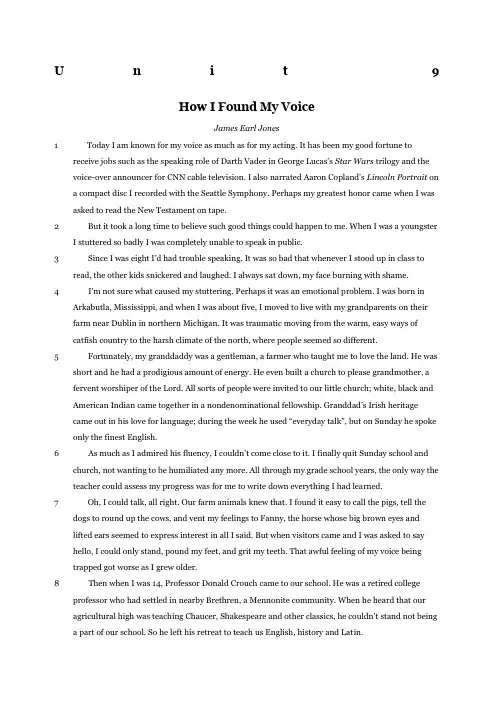
U n i t9How I Found My VoiceJames Earl Jones1 Today I am known for my voice as much as for my acting. It has been my good fortune toreceive jobs such as the speaking role of Darth Vader in George Lucas’s Star Wars trilogy and the voice-over annou ncer for CNN cable television. I also narrated Aaron Copland’s Lincoln Portrait ona compact disc I recorded with the Seattle Symphony. Perhaps my greatest honor came when I wasasked to read the New Testament on tape.2 But it took a long time to believe such good things could happen to me. When I was a youngsterI stuttered so badly I was completely unable to speak in public.3 Since I was eight I’d had trouble speaking. It was so bad that whenever I stood up in class toread, the other kids snickered and laughed. I always sat down, my face burning with shame.4 I’m not sure what caused my stuttering. Perhaps it was an emotional problem. I was born inArkabutla, Mississippi, and when I was about five, I moved to live with my grandparents on their farm near Dublin in northern Michigan. It was traumatic moving from the warm, easy ways ofcatfish country to the harsh climate of the north, where people seemed so different.5 Fortunately, my granddaddy was a gentleman, a farmer who taught me to love the land. He wasshort and he had a prodigious amount of energy. He even built a church to please grandmother, a fervent worshiper of the Lord. All sorts of people were invited to our little church; white, black and American Indian came togeth er in a nondenominational fellowship. Granddad’s Irish heritagecame out in his love for language; during the week he used “everyday talk”, but on Sunday he spoke only the finest English.6 As much as I admired his fluency, I couldn’t come close to i t. I finally quit Sunday school andchurch, not wanting to be humiliated any more. All through my grade school years, the only way the teacher could assess my progress was for me to write down everything I had learned.7 Oh, I could talk, all right. Our farm animals knew that. I found it easy to call the pigs, tell thedogs to round up the cows, and vent my feelings to Fanny, the horse whose big brown eyes andlifted ears seemed to express interest in all I said. But when visitors came and I was asked to say hello, I could only stand, pound my feet, and grit my teeth. That awful feeling of my voice being trapped got worse as I grew older.8 Then when I was 14, Professor Donald Crouch came to our school. He was a retired collegeprofessor who had settled in nearby Brethren, a Mennonite community. When he heard that our agricultural high was teaching Chaucer, Shakespeare and other classics, he couldn’t stand not beinga part of our school. So he left his retreat to teach us English, history and Latin.9 Donald Crouch was a tall, lean man with gray hair; English was his favorite subject, poetry washis deepest love. He’s been an associate of Robert Frost. He held a book of poems as if it were adiamond necklace, turning pages as if uncovering treasures. He memorized a poem every day,explaining that if he ever lost his eyesight he would still be able to savor all that beauty.10 When he learned that I not only loved poetry but was writing it, we found a kinship. There was,however, one difficulty between us. Professor Crouch (we always called him that) could not stand the fact I refused to read my poems to the class.11 “Jim, poetry is meant to be read aloud, just like sermons,” he pressed. “You should be able tospeak those beautiful words.”12 I shook my head and turned away.13 Then he tricked me. I labored long and hard on a poem, and after handing it in I waitedexpectantly for his critique. It didn’t come. Instead, one day as the students assembled, hechallenged me. “Jim, I don’t think you wrote this.”14 I stared at him in disbelief. “Why,” I started, anger flooding me, “of course I did!”15 “Well, then,” he said, “you’ve got to prove it by getting up and reciting it from memory.”16 By then the other students had settled at their desks. He looked at me meaningfully and nodded.With knees shaking, I walked up before my peers.17 “Jim will recite his latest poem,” announced Professor Crouch.18 For a moment I stood breathless. I could see smirks and wry smiles on some faces. Then Ibegan. And kept going. I recited my poem all the way through without hesitation or fault! I stood amazed and floated back to my desk in a daze, amid wild applause.19 Afterward, Professor Crouch congratulated me. “Aha,” he said. “Now we have something here.Not only will you have to write more poetry and read it aloud to know how good it feels, but I’m sure that you will want to read other writers’ poetry before the class.”20 I was dubious about that, but said I’d try.21 Soon I began to discover something other stutterers know. Most have no problem singingbecause the lyrics’ rhythmic pattern flows by itself. I found the same cadences in poetry, and before long my fellow students actually looked forward to hearing me recite. I loved the rolling beat of The Song of Hiawatha, especially since I had Indian blood in my veins.22 I discovered I did have a voice, a strong one. Under Professor Crouch’s tutelage, I enteredoratorical contests and debates. He never pushed anything at me again; he just wanted all hisstudents to wake up.23 As my stuttering disappeared, I began dreaming of becoming an actor, like my father, who wasthen performing in New York City. No one in my family had ever gone to college. But encouraged by Professor Crouch, I took exams and won a scholarship to the University of Michigan.24 There I entered the drama department and after graduation fulfilled my ROTC responsibilityby serving with the Army’s Cold Weather Training Co mmand on mountain maneuvers in Colorado.25 Later, on the GI Bill, I signed up with the American Theater Wing in New York and supportedmyself between roles by sweeping floors of off-Broadway stages. In 1962 I earned an Obie for my role in an off-Broadway production of Othello, and have been an actor ever since.26 Meanwhile, I always kept in touch with my old professor, by letter and telephone. Every timewe talked it was always, “Hi, Jim. Read any good poetry lately” He was losing his sight and Iremembered his early explanation of why he had memorized poetry. In later years when I wasdoing Shakespeare’s Timon of Athens at the Yale Repertory Theater in New Haven, Connecticut, I phoned him. “Can I fly you in from Michigan to see it”27 “Jim,” he sighed, “I’m blind now. I’d hate not to be able to see you acting. It would hurt toomuch.”28 “I understand, Professor,” I said, helped in part by the realization that though my mentor couldno longer see, he was still living in a world vibrant with all of the beautiful treasures he had stored.29 About two years later I learned Donald Crouch had passed on. When I was asked to record theNew Testament, I really did it for a tall, lean man with gray hair who had not only helped to guide me to the author of the Scriptures, but as the father of my resurrected voice, had also helped me find abundant life.找回声音詹姆斯·厄尔·琼斯1 今天我在声音方面的名气一点都不逊色于我的表演。

unit4汉译英范文第一篇:unit4 汉译英范文Unit41.该是吃早饭的时候了。
It’s time _______ _________.= It’s time ________ ________ _________.2.我们到山上散步好吗?_________ we _________ _______ in the hill?3.某些狗根本不知道如何玩得开心。
Some dogs just don’t know ________ _______ _________ _________.4.我们每天8:15开始上课。
We _________ lessons at a __________ __________ eight.5.通常我们首先做早操。
We usually __________ morning ________ _________.6.我最爱的科目是地理。
My ____________ __________ is ______________.7.课后,我们相互聊天。
After class, we _________ ________ ________ _________.8.我们经常在星期三和星期五读书。
We often read books ___________ __________ and _______________.9.我们在星期二操练打排球。
We ___________ _____________ volleyball ________ ___________.10.每年三月我们植树。
We ___________ ___________ _________ _________ every year.11.中国的孩子六岁开始上课。
Children in China __________ lessons _______ the ________ ________ six.12.我想告诉你关于我的学校生活。
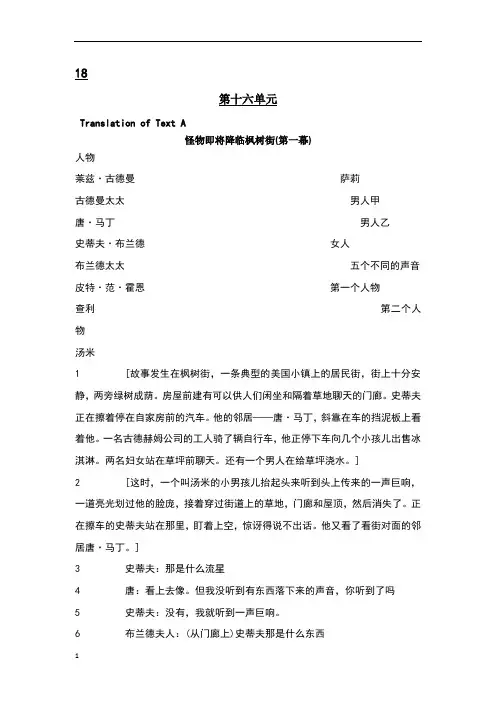
18第十六单元Translation of Text A怪物即将降临枫树街(第一幕)人物莱兹·古德曼萨莉古德曼太太男人甲唐·马丁男人乙史蒂夫·布兰德女人布兰德太太五个不同的声音皮特·范·霍恩第一个人物查利第二个人物汤米1 [故事发生在枫树街,一条典型的美国小镇上的居民街,街上十分安静,两旁绿树成荫。
房屋前建有可以供人们闲坐和隔着草地聊天的门廊。
史蒂夫正在擦着停在自家房前的汽车。
他的邻居——唐·马丁,斜靠在车的挡泥板上看着他。
一名古德赫姆公司的工人骑了辆自行车,他正停下车向几个小孩儿出售冰淇淋。
两名妇女站在草坪前聊天。
还有一个男人在给草坪浇水。
]2 [这时,一个叫汤米的小男孩儿抬起头来听到头上传来的一声巨响,一道亮光划过他的脸庞,接着穿过街道上的草地,门廊和屋顶,然后消失了。
正在擦车的史蒂夫站在那里,盯着上空,惊讶得说不出话。
他又看了看街对面的邻居唐·马丁。
]3 史蒂夫:那是什么流星4 唐:看上去像。
但我没听到有东西落下来的声音,你听到了吗5 史蒂夫:没有,我就听到一声巨响。
6 布兰德夫人:(从门廊上)史蒂夫那是什么东西7 史蒂夫:亲爱的,我猜是颗流星。
飞得太近了,不是吗8 布兰德太太:太近了!(人们站在门廊前,一边观察一边低声交谈着。
我们看到一个男人正在前门廊上拧灯泡,然后从凳子上下来去打开开关,但灯没有亮。
另一个男人正在摆弄电动割草机。
他把插头插入插座,反复按着开关,但割草机没有任何反应。
透过前门廊的一扇窗户,人们可以看到一位妇女正在打电话。
)9 女人:接线员,接线员,电话坏了,接线员!10 (布兰德太太从屋里走出来到门廊上。
)布兰德太太:(喊到)史蒂夫,停电了。
我还在炉子上煮着汤呢,可炉子刚刚没电了。
11 女人:这儿也是。
电话也打不通了。
电话好像坏了。
12 第一个声音:停电了。
13 第二个声音:电话不通了。
14 第三个声音:收音机什么也收不到。
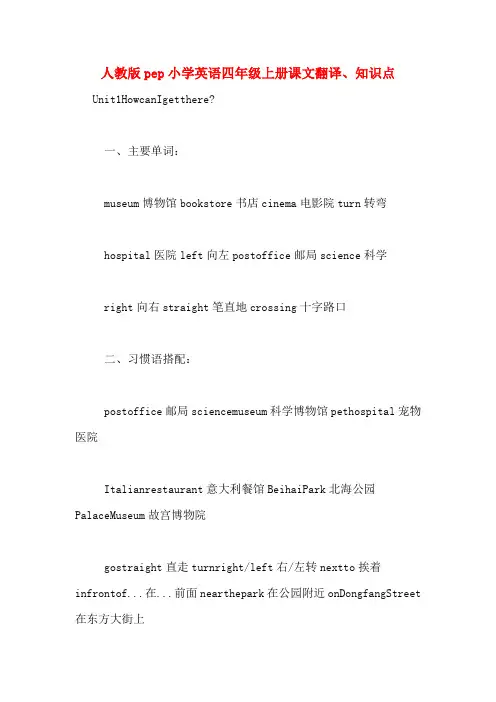
人教版pep小学英语四年级上册课文翻译、知识点Unit1HowcanIgetthere?一、主要单词:museum博物馆bookstore书店cinema电影院turn转弯hospital医院left向左postoffice邮局science科学right向右straight笔直地crossing十字路口二、习惯语搭配:postoffice邮局sciencemuseum科学博物馆pethospital宠物医院Italianrestaurant意大利餐馆BeihaiPark北海公园PalaceMuseum故宫博物院gostraight直走turnright/left右/左转nextto挨着infrontof...在...前面nearthepark在公园附近onDongfangStreet 在东方大街上三、惯用表达式:Excuseme打扰一下Followme,please!请跟着我!四、公式化句型:1、问路的句型及其答语:问句:Whereisthe+地点?···在哪儿?答语:It’s+表示地点的词语。
它···。
nexttothebookstore,nearthehospital/postoffice,overthere, onDongfangStreet,infrontoftheschool...2、询问怎么到某地的句型及其答语:问句:Howcan+主语+get(to)+地点?···怎么到···?同义句型:Canyoutellmethewayto+地点?Whereis+地点?Whichisthewayto+地点?答语:Turn+方向+表示地点的介词短语。
···转。
atthecinemaatthecornernearthepostoffice...五、例句:Whereisthecinema,please?请问电影院在哪里?It’snexttothehospital.它与医院相邻。

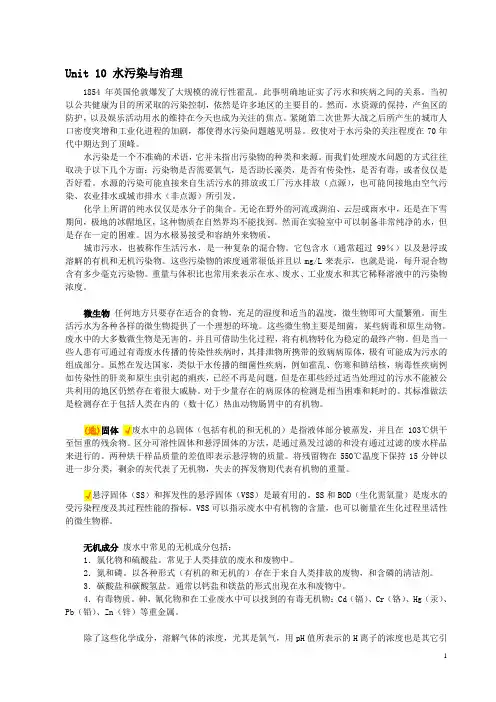
Unit 10 水污染与治理1854年英国伦敦爆发了大规模的流行性霍乱。
此事明确地证实了污水和疾病之间的关系。
当初以公共健康为目的所采取的污染控制,依然是许多地区的主要目的。
然而,水资源的保持,产鱼区的防护,以及娱乐活动用水的维持在今天也成为关注的焦点。
紧随第二次世界大战之后所产生的城市人口密度突增和工业化进程的加剧,都使得水污染问题越见明显。
致使对于水污染的关注程度在70年代中期达到了顶峰。
水污染是一个不准确的术语,它并未指出污染物的种类和来源。
而我们处理废水问题的方式往往取决于以下几个方面:污染物是否需要氧气,是否助长藻类,是否有传染性,是否有毒,或者仅仅是否好看。
水源的污染可能直接来自生活污水的排放或工厂污水排放(点源),也可能间接地由空气污染、农业排水或城市排水(非点源)所引发。
化学上所谓的纯水仅仅是水分子的集合。
无论在野外的河流或湖泊、云层或雨水中,还是在下雪期间,极地的冰帽地区,这种物质在自然界均不能找到。
然而在实验室中可以制备非常纯净的水,但是存在一定的困难。
因为水极易接受和容纳外来物质。
城市污水,也被称作生活污水,是一种复杂的混合物。
它包含水(通常超过99%)以及悬浮或溶解的有机和无机污染物。
这些污染物的浓度通常很低并且以mg/L来表示,也就是说,每升混合物含有多少毫克污染物。
重量与体积比也常用来表示在水、废水、工业废水和其它稀释溶液中的污染物浓度。
微生物任何地方只要存在适合的食物,充足的湿度和适当的温度,微生物即可大量繁殖。
而生活污水为各种各样的微生物提供了一个理想的环境。
这些微生物主要是细菌,某些病毒和原生动物。
废水中的大多数微生物是无害的,并且可借助生化过程,将有机物转化为稳定的最终产物。
但是当一些人患有可通过有毒废水传播的传染性疾病时,其排泄物所携带的致病病原体,极有可能成为污水的组成部分。
虽然在发达国家,类似于水传播的细菌性疾病,例如霍乱、伤寒和肺结核,病毒性疾病例如传染性的肝炎和原生虫引起的痢疾,已经不再是问题,但是在那些经过适当处理过的污水不能被公共利用的地区仍然存在着很大威胁。
【导语】新概念英语⽂章短⼩精悍,语句幽默诙谐,语法全⾯系统。
适合各个阶层的⼈群学习参考。
相信有了新概念英语,你也可以成为“⼤神”级别的⼈物!还在等什么?快来加⼊学习吧!⽆忧考⼩编与您⼀起学习进步!新概念英语第四册Lesson14原⽂及翻译 The Butterfly Effect 蝴蝶效应 Why do small errors make it impossible to predict the weather system with a high degree of accuracy? Beyond two or three days, the world's best weather forecasts are speculative, and beyond six or seven they are worthless. The Butterfly Effect is the reason. For small pieces of weather -- and to a global forecaster, small can mean thunderstorms and blizzards -- any prediction deteriorates rapidly. Errors and uncertainties multiply, cascading upward through a chain of turbulent features, from dust devils and squalls up to continent-size eddies that only satellites can see. The modern weather models work with a grid of points of the order of sixty miles apart, and even so, some starting data has to guessed, since ground stations and satellites cannot see everywhere. But suppose the earth could be covered with sensors spaced one foot apart, rising at one-foot intervals all the way to the top of the atmosphere. Suppose every sensor gives perfectly accurate readings of temperature, pressure, humidity, and any other quantity a meteorologist would want. Precisely at noon an infinitely powerful computer takes all the data and calculates what will happen at each point at 12.01, then 1202, then 12.03... The computer will still be unable to predict whether Princeton, New Jersey, will have sun or rain on a day one month away. At noon the spaces between the sensors will hide fluctuations that the computer will not know about, tiny deviations from the average. By 12.01, those fluctuations will already have created small errors one foot away. Soon the errors will have multiplied to the ten-foot scale, and so on up to the size of the globe. JAMES GLEICK, Chaos New words and expressions ⽣词和短语 forecast n. 预报 speculative adj. 推测的 blizzard n. 暴风雪 deteriorate v. 变坏 multiply v. 增加 cascade v. 瀑布似地落下 turbulent adj. 狂暴的 dust devil ⼩尘暴,尘旋风 squall n. 暴风 eddy n. 旋涡 grid n. 坐标⽅格 sensor n. 传感器 humidity n. 温度 meteorologist n. ⽓象学家 Princeton n. 普林斯顿(美国城市名) New Jersey n. 新泽西(美国州名) fluctuation n. 起伏,波动 deviation n. 偏差 参考译⽂ 世界上的两三天以上的天⽓预报具有很强的猜测性,如果超过六七天,天⽓预报就没有了任何价值。
Unit 4 英语中窥视性别歧视现象只有作者们在下笔之前意识到哪些用词带有性别歧视倾向,性别歧视才有可能在语言中得到消除。
通常来说,作者们很难有这样的意识,因为在我们的文化中,很容易就下意识得去区分两性。
这在我们的用词中可以得到体现。
每个人类社会都认识到权利和命名之间存在的关系:一个人对另一人或事物命名的同时也对它们施加了权利。
在圣经的创世纪这一章中,亚当给所有的动物命了名,并控制管理着它们。
接着,亚当又给他妻子取了名叫夏娃。
这些拥有给其他事物不管是动物还是妻子命名的权利的人,都把自己看成一个标准来对别人进行衡量。
英语是一种反映以男性为中心的文化的语言,因为英语国家世世代代发展都是由男人来起主导作用的。
他们掌控着主要的社会机构:政府,法律,商业,教育和宗教;他们推动者历史发展,是创造历史的主体力量。
在这样的社会文化中,人们的语言也就自然会表达出男性占统治地位的观念。
这是人类学中一项基本的研究。
人类学家们知道要去认识任何一种社会文化最好的办法是去研究语言中的词汇,因为人们的措辞反映了当时的社会生活。
当然问题来了:究竟反映的是谁的社会呢?英语反映的仍旧是男性有主导特权的社会。
众所周知,英语中含有大量强调两性差异的词语,甚至有很多词描绘了两性的两级对立状态。
为了繁殖后代,男女两性之间有不同的生理特点,除了考虑这点之外,其实每个个体又还具有不同的个性,或多或少的包含了阳刚与阴柔两者的特质。
事实上没有人是极端得阳刚或极端的阴柔。
但是这种极端的观念却深深的在我们的文化中扎了根,在我们的词汇中得到强调,在人们的心中得到支持。
女性是负面且卑微的在英语中,女性往往是拥有负面形象且卑微的,相对的,男性是正面的,高高在上的。
如果你觉得这是夸大之词,那么请翻开字典,看看词典编撰者对一对跟性别有关的词---manly 与womanly所下的定义。
以下引用的定义来自于韦氏第三版新国际英语大辞典(1986)。
Manly: 1.a. 有男子气概的,不柔弱,不羞怯,勇敢,坚定,开放....;b.(1). 属于男人或适合男人的。
参考译文1)Education played a vital role in ancient Chinese culture. The origin of ancient Chinese education dates back to the educational ideas of the “Hundred Schools of Thought” in the middle and late Zhou Dynasty. It provided people with equal chance for development. Individuals from even the humblest backgrounds could rise to a higher level. In the Spring and Autumn Period, Confucius, the great educator, broke the rule of learning at the government hall. Private schools prevailed(流行,盛行)and many scholars of different schools of thought spread their teaching in this way and this led to the flourishing and contending of hundreds of schools.2)Confucius was an educator as well as a philosopher. His thoughts and theories had impact on people in many aspects such as ethics, moral principles and rules of life. One of the features of Confucius’ thoughts is his emphasis on education and learning. In the relationship between learning and thinking, he believed that learning and thinking were equally important. He believed th at, “Learning without thought is labor lost; thought without learning is perilous(危险的).” He considered moral education the most important.。
第六单元夏威夷来到夏威夷,一走下飞机,生活的节奏便开始放慢。
这里的空气湿度很大,棕榈树在暖洋洋的微风里摇曳,五彩缤纷的鲜花随处可见。
在我看来,夏威夷是一处旅游胜地,也是一种生活态度。
它那轻松休闲的文化融合了夏威夷式不拘一格的思维方式和多彩多姿的文化习俗。
1500多年前,第一批夏威夷人开始在这片岛屿上定居,每座岛屿成为一个独立的王国。
1820年,美国白人首次出现,接踵而至的是中国、日本和葡萄牙的定居者。
1810年夏威夷群岛成为一个统一王国,其政权在1893年被一群美国人推翻。
1898年夏威夷成为美国准州,并于1959年成为其第50个州。
夏威夷首府火奴鲁鲁坐落在瓦胡岛上,人口逾85万。
像多数大城市一样,该市交通拥挤,人口稠密。
但这里没人鸣喇叭(这被视为不雅之举),就连车流也没有了常见的疯狂速度。
如果你不想驾车,就大可不必,因为公交系统安全可靠、经济实惠、使用方便。
事实上,它是在火奴鲁鲁观光、接触当地人的最好途径之一。
火奴鲁鲁有几个各具特色的社区。
市中心是一个商业区,区内有夏威夷州立图书馆和火奴鲁鲁市政厅。
来到这里,一定要去看看美丽的伊奥拉尼王宫--美国国土上唯一的王宫。
另一个历史悠久的社区是唐人街。
作为美国最古老的唐人街,这里汇集了许多中国、泰国和越南风味的小餐馆,其中1882年建成的和发餐馆是当地人最喜欢光顾的餐馆之一。
唐人街里的观音庙是火奴鲁鲁最古老的庙宇,现在仍然有许多人来此烧香拜佛。
在火奴鲁鲁,到处都是购物良机。
你可以找到非常典型的夏威夷纪念品,比如夏威夷衬衫或本岛产的咖啡,这些都可以在遍布群岛的希洛哈蒂商店里买到。
也许岛上最受欢迎的旅游景点是那些美丽的夏威夷海滩,那里有温暖的海水、丰富的海洋生物和干净的沙滩。
长达1.5英里的威基基海滩在火奴鲁鲁最富盛名,但当地人却钟情于其他一些海滩。
阿拉冒纳海滩有一个占地76英亩的公园,可供游泳和垂钓。
夏威夷群岛上的生活轻松而闲适。
你可以有更多的时间四处走走。
Unit16 Gravity Measurment(重力测量)As known from daily experience , the most conspicuous force present on the surface of the Earth is gravity . Gravity is the force that pulls things towards the center of the Earth .Gravity affects almost everything in our lives . From clocks to hydroelectric dams, from the tides of the oceans to plant life, gravity plays an important role . Gravity governs our height and shape and keeps us fro m falling off the surface of the Earth .(从日常经验中得知,地球表面最显著的引力是重力。
地心引力是把东西拉向地球中心的引力 我们生命中的一切。
从时钟到水电站,从海洋的潮汐到植物的生命,重力起着重要的作用。
重力支配着我们的高度和形状,使我们保持活力 会关闭地球的表面。
)Concepts of Gravity(重力的概念)Gravitation is the force that pulls or attracts all bodies in the universe towards one another .The famous law of universal gravitation , first formulated mathematically by Newton states the fact that any two physical bodies attract each other . This gravitation force , which is proportional to the product of the t w o m asses ( M and m ) and inversely proportional to the square of their distance, can be expressed as follows:(万有引力是吸引或吸引宇宙中所有物体的力量,万有引力定律,由牛顿在数学上首次表述为 任何两个身体互相吸引。
Unit 16 篇章翻译(四)课时:2H教学目的要求:了解如何使用各种技巧进行篇章的翻译。
教学重点:把握在语篇翻译中使用各种翻译技巧,了解关于教育内容的语篇翻译。
教学难点:根据翻译的要求,可采用不同的策略,如编译等。
教学内容:Part I:[背景知识:关于中国教育]Since 1949 when the Peopl e’s Republic of China was founded, the Chinese government has always placed education high on its agenda, and has promulgated multiple codes to safeguard the educational rights of its people, especially of ethnic groups, children, women and the disabled. Through uninterrupted efforts over the past five decades, China has made significant progress in its educational sector.The nine-year compulsory education is being implemented nationwide in stages in a planned way. Primary schooling has been popularized in areas inhabited by 91% of the Chinese population. Higher education, occupational and polytechnic education, diversified adult education and ethnic education have been developing rapidly. All this have contributed to the formation of a multi-tiered, diversified and discipline-inclusive educational system in China and facilitated the cross-border communication and cooperation in the educational sector.广东外语艺术职业学院是2001年经广东省人民政府批准建立的专科层次的全日制普通高等学校,主要为广东省基础教育承担培养培训外语、艺术、信息技术类教师的任务, 同时为社会发展需要培养各类专门人才。
(Division) Guangdong Teachers College of Foreign Language and Arts is a public full-time institute of higher education, whose establishment was approved by Guangdong Provincial Government. It aims at nurturing and training teachers of English, arts, information technology for elementary (basic) education in Guangdong as well as all kinds of professionals demanded by the society.学院在“广东外国语师范学校”和“广东艺术师范学校”的基础上组建而成, 拥有两个校区,校园花木葱茏,环境优美。
作为原广东省教育厅直属的重点师范学校,重组前两校已有17年大专办学历史,积累了基础教育师资培养和培训的丰富经验。
20多年来两校为社会培养了大量优秀的英语和艺术教育教学人才,其中不少毕业生已成为当地教育部门的领导、教学科研骨干和学术带头人,为发展教育事业做出了突出贡献,得到各地教育行政部门及社会各界人士的高度赞誉。
The College, established by merging Guangdong Foreign Language TeachersSchool and Guangdong Teachers School of Arts, is composed of two sub-campuses, both of which have a pleasant environment with green grass and fresh air.As the key teachers school under the direct leadership of former Guangdong Department of Education, both schools have offered college programs for 17 years, accumulating rich experience in teacher preparation and on-the-job training for teachers. Over the last two decades, a large number of outstanding students of English education and art education have graduated from the College, many of whom have become the backbones of the local educational bureau and the pillars of educational and academic research. They enjoy a reputation for their tremendous contribution to education.Pillar: an active and important member of a particular field学院设外语系、音乐系、美术系、学前教育系、信息技术系、中文系、基础部、现代教育技术中心和继续教育学院,开展全日制和成人学历教育。
各类在校生近5000人。
学院师资队伍年富力强、治学严谨、教学经验丰富、科研能力较强。
(Adaptation) 现有专职教师264人,其中正、副教授71人,博士、硕士59人,具有中国和英、美、澳大利亚、新西兰、泰国等不同国家的广泛的国际教育背景,教师的作品分别被人民大会堂、毛主席纪念堂、瑞士博物馆等场馆收藏。
此外,学院还聘有10名外籍教师。
The College possesses the Department of Foreign Language, the Department of Music, the Department of Fine Arts, the Department of Preschool Education, the Department of Information Technology, the Department of Chinese Language and Culture, the Center for Modern Educational Technology and the School of Continuing Education. Currently, there are about 5000 part-time and full-time students in the College.The college is noted for a competent teaching staff with rich teaching experience and varied academic achievements. There are 264 full-time teachers, including 71 professors and associate professors, 59 doctors and masters. A lot of them have furthered their studies in Britain, the United States, Australia, New Zealand and Thailand. Some teachers’ works are collected in the Great Hall of the People, the Chairman Mao Memorial Hall and the Museum of Switzerland. Furthermore, there are more than ten international teachers in the College each year.Works: He pulled out a large green volume containing all of Chopin’s works.[策略点拨:编译(Adaptation)]Adaptation: The translation recasts the original so as to have the desired impact on an audience that is substantially different from that of the original; as when an adult text is adapted for children, a written text is adapted for television.Part II:上海外国语大学是中国教育部直属的一所高等外国语学校。
自1981年开始招收外国留学生。
1985年正式成立对外汉语系和留学生办公室,1995年改建为国际文化交流学院。
留学生分别来自日本、韩国、美国、法国、瑞士等国家,人数逐年增多,现在在读的本科生有300多名,非学位留学生近400人。
Shanghai International Studies University is a foreign language institution of higher learning directly under the Ministry of Education of the People’s Republic of China. It began to enroll international students in 1981 and established the Department of Chinese as a Foreign Language and the International Students Office in 1985, which were reorganized into the College of International Cultural Exchange in 1995. International students come from Japan, Korea, the United States, France, Switzerland and other countries. The number of enrollment is on the increase each year. At present, some 300 undergraduate students are studying at the college, and the number of non-degree students is around 400.[点拨与思考:外语院校名称的翻译]广东外语外贸大学Guangdong University of Foreign Studies西安外国语学院Xi’an International Studies University四川外国语学院Sichuan International Studies University北京外国语大学Beijing Foreign Studies University北京语言文化大学Beijing Language and Culture University上海外国语大学Shanghai International Studies University由于是综合型外语院校,因此,都没有出现foreign language 的字眼,而用international studies, 覆盖的学科更广泛。